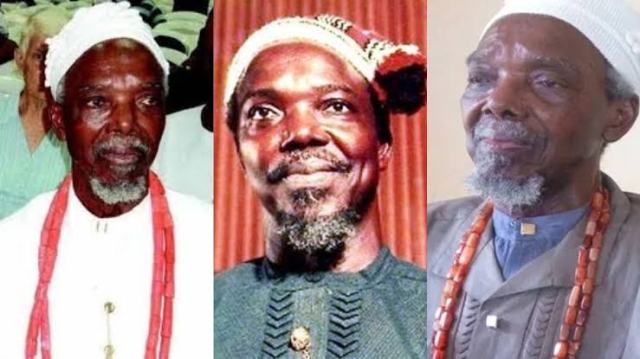Alvan Ewuzie
Since the demise of his only child, Prince Osita Ike, a little over three years ago, I had watched Professor Chukwuemeka Ike gradually lose his steady gait, one that often bellied his age. I do not impute that Professor Ike’s passage at 88 is unusual, in a country where people who pass on in their 70s are presumed to have done so in ‘ripe old age’. But the instinct lingers that his son’s death took a toll on him. I recall the rather emotional text he sent to me when Osita was to be interred, one which betrayed his emotional trauma over the incident. Osita, a Poet, Journalist and Public Relations Practitioner, was reportedly claimed by an attack of asthma, one which defied first aid, and eventual medical intervention. This is not about Osita, who also managed his father’s public relations, but about late Professor Chuwkuemeka Ike, His Royal Highness the ‘Ikelionwu IX’ of Ndikelionwu in Orumba local Government area of Anambra state. His passage to the great beyond on Thurdsay January 9, 2020, at Nnamdi Azikiwe University Teaching Hospital Nnewi, few months to his 89th birthday, was a knife cut through the declining tribe of old novelists. He has joined the league of Chinua Achebe, John Munoyne, Cyprain Ekwensi, Nkem Nwankwo, Flora Nwapa and others, who wrote works of fiction that defined an era of literary existence.
I had encountered Professor Ike no less than three times, two of them facilitated by the late Chinua Achebe, though vicariously. One of them was the Chinua Achebe Interview series, under the aegis of the Chinua Achebe Foundation, ran by Dr. Chidi Achebe. The literary giant, Chinua Achebe, was alive then. I went to Ndike with late Professor Ossie Enekwe, and my colleague, Uduma Kalu. Professor Ike spoke in his usual candour, flawless logic and subtle satire. The next, and the last, was at the demise of Chinua Achebe. His interview was part of a special tribute published in honour of the late icon. In that interview he admitted that his writings, like that of Achebe, were influenced by Igbo cultural norms, which is why, in his view, readers see him in (Ike), like Achebe. They would rather deal with Achebe, than him, in his view.
But Ike was a writer who made his mark in literary incursion into themes that held significant perspectives to everyday life. I have made a duty of reading everything I could find on the Nigerian Civil war, fiction and nonfiction, and in my estimation, Chukwuemeka Ike’s novel, Sunset at Dawn ranks amongst the best works of fiction on the war. He has several other fictional work; Toads for Supper, Our Children are Coming, Expo ’77, The Potter’s Wheel, The Chicken Chasers, The Bottled Chasers, Conspiracy of Silence.
His books, Conspiracy of Silence and Our Children Are Coming interrogated some cultural practices that have remained open secrets. When a widow continues to bear children, for instance, culture holds that the children belong to her late husband even when the villagers know the biological father of those children, and they are replicas of the ‘sperm donor’, but no one dares say so, and the children must never relate to him as their father. In the novels mentioned, Ike examines those themes in his stories.
He was an accomplished administrator, who became Registrar of University of Nigeria, Nsukka, where he faced the challenge of reopening the University after war had ravaged Eastern Nigeria. He told me, in one of the three interviews he granted me, that the assignment of reopening the University after the war, ranks high amongst the most challenging in his annals. He became Registrar of West African Examinations Council(WAEC). He retired early, and dedicated himself to his writing. In spite of his strong cultural roots, he believed in pursuing love to where you find it. His Wife Professor Adebimpe Ike, a librarian, who did a lot in setting up the Nigerian Book Foundation, hailed from the Western part of Nigeria. She is an Ibadan Princess. Theirs became one of the celebrated poster cases of inter-tribal marriages in the country. He was a cultural icon who was not fixated about not opening to new ideas.
There is, however, a sad incident that has dogged his Royal stool. I hope the matter has been resolved though as at press time, there is no information to that positive effect. I began this piece with his late son, Osita Ike who passed away at 54 over three years ago. Professor Ike often lamented that Osita seemed not to be in a hurry to marry, and give him grandchildren. But Osita eventually got married, and had a son. But the marriage ran into challenges, leading to a separation, which was not resolved until Ike passed away. The woman went away with Professor Ike’s grandson, and seem to have resolved that neither her estranged husband nor would his parents would set eyes on the boy, who ought to have been the heir apparent to the throne of Ndikelionwu. As I write this, indications are thin that there is a heir to that throne which the late professor inherited from his father. His son had passed away ahead of him which implies that his grandson should step up. I have no details of the separation, and its current state, but I join those who advocate that late Professor Ike’s grandson be brought back by the estranged daughter-in-law to prevent a void in the throne of his fathers. One of the greatest honours that can be done to the departed icon is to get his grandson back, not ruling out other measures the Anambra state and his community would take to immortalize the icon. If his grandson is still a minor, the throne can be held in proxy for him. That ancient stool should not die with the literary giant. Everyone concerned should make it a duty to fill that void.































































